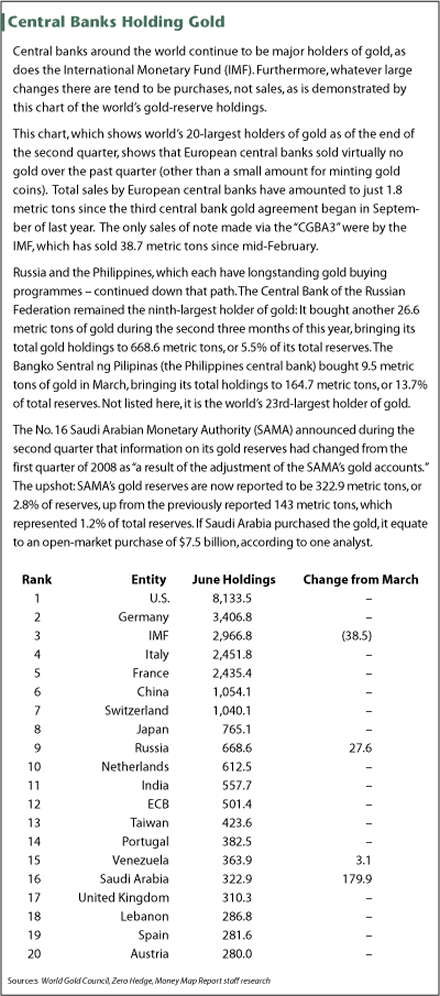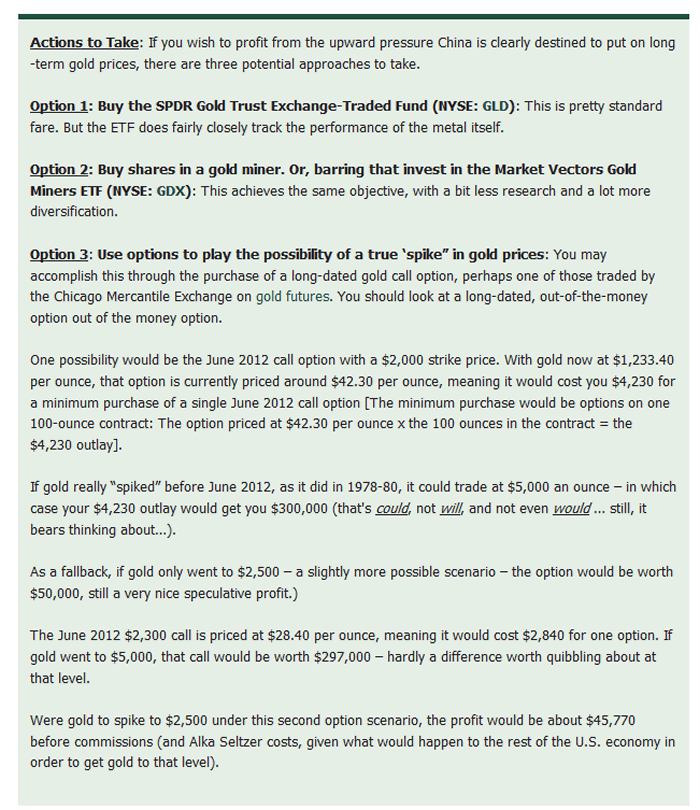China Causes Gold Prices to Spike, How to Profit?
Commodities / Gold and Silver 2010 Aug 17, 2010 - 05:51 AM GMTBy: Money_Morning
 Martin Hutchinson writes:
When recently gold sold off and fell as much as 8% below its record high level of $1,260 an ounce, investors had to be more than a little concerned.
Martin Hutchinson writes:
When recently gold sold off and fell as much as 8% below its record high level of $1,260 an ounce, investors had to be more than a little concerned.
With the huge debt loads top world economies have taken on to rebound from the worst financial crisis since the Great Depression, investors have grabbed onto gold as the best way to hedge against the inflation and other financial calamities they felt were certain to come. So far, those calamities haven't materialized.
But those investors shouldn't be worried. There's another catalyst on the horizon. It's headed directly for us. And, at least as far as gold prices are concerned, it figures to be an almost ideal catalyst: Even if it doesn't spawn the near-term price spikes some gold bugs predict, it's a near-certainty to send the yellow metal skyward in the long run.
I'm talking, of course, about China.
The New Economic Heavyweight
When it comes to gold prices, two news items relating to China have to warm investor hearts. First, China has again moved to liberalize further its domestic citizens ability to purchase gold. Chinese citizens are among the world's most avid savers, meaning they'll have plenty of money to invest in gold – just as Beijing is telling them to do.
And just yesterday (Monday), in fact, headlines declared that China was making the move to leapfrog Japan and become the world's second-largest economy. With those two catalysts, and China's economy continuing to grow at 10% per annum, gold investors can happily anticipate an early price breakthrough to new highs.
And that's not all.
The People's Bank of China, China's central bank, has traditionally held about 10% of its reserves in gold – making it a global heavyweight in the precious-metals sector. But as that country's overall reserves zoomed past the $2 trillion mark in recent years, the percentage of those reserves held in gold declined sharply. At the end of March, for instance, despite an increase in gold holdings to 1,054 metric tons, the yellow metal still only represented 1.5% of China's reserves.
Going For Gold
China's central bank, which has expressed ongoing concerns about the performance of the U.S. dollar, suggested that “the need to perfect foreign-exchange policies in the gold market is clear.” Granted, that statement could be construed to mean just about anything. But the odds are very good that Beijing will push for the purchase of more gold in the months to come.
 While China will attempt to add to its gold holdings without disrupting the global metals market, even a cursory look at the mathematics of the world market for the yellow metal underscores that Beijing faces a real challenge.
While China will attempt to add to its gold holdings without disrupting the global metals market, even a cursory look at the mathematics of the world market for the yellow metal underscores that Beijing faces a real challenge.
First, understand that the annual output of all the world's gold mines is only about $110 billion. Second, the value of all the gold ever mined is only about $6 trillion. The upshot: A major reserves holder like China can very easily disrupt the market, causing prices to “spike” uncontrollably.
That doesn't include the possible market impact of a nation with 1.3 billion potential investors – a potential market impact that isn't difficult to picture.
While the gold policies of China's central bankers may be somewhat inscrutable, the growing interest the Chinese people have in gold and other precious metals is out in the open.
In 2009, Chinese investors bought 73 metric tons of bullion, with a value of about $2.6 billion at today's prices. That total – 73 metric tons – is not, in itself, a huge amount of gold; Indian investors bought 147 metric tons, or twice that amount – in this year's first quarter alone.
However, there's an increasing acceptance of gold as an investment that's washing across China, and that cannot be discounted. For example, the 73 metric tons of bullion bought by Chinese investors last year was more than four times the 18 metric tons that same group bought just two years before.
The increasing acceptance of gold-based investment by the huge Chinese pool of retail investment capital cannot fail to put upward pressure on prices. And Beijing seems to be making certain that this pressure is brought to bear.
Profiting From China's Muscle
China opened the door on gold investments to retail investors last year; by the third quarter, Beijing was actively encouraging retail investors to make investments in gold and silver.
In the past, Chinese authorities have encouraged Chinese citizens to invest in gold as an alternative to the very speculative Chinese stock markets and the over-leveraged real estate market.
Gold is becoming a much-more-mainstream investment option. China's leaders have increased the number of banks allowed to deal in bullion and increased the ability to purchase gold-linked investment products by using yuan, instead of U.S. dollars or some other foreign currency.
If Chinese investors become serious buyers of gold, their purchases are likely to be contra-cyclical to China's stock market – and, thus, to global stock markets as a whole. When, as in 2006 and 2009, the Shanghai and Shenzen stock markets are soaring, domestic speculation pushes prices to extreme levels. Those money flows are likely to switch to gold if Chinese stock markets continue to lose ground.
Moreover, the large pay increases awarded to many Chinese workers in foreign-owned plants –such as the 30% award to the 300,000 workers in the Foxconn International Holdings (PINK ADR: FXCNY) plant – must inevitably push up both Chinese purchasing power and Chinese inflation.
The “official” inflation rate was only 2.9% according to government figures released in June, but China's official inflation figures traditionally understate the reality. While silver – and not gold – has been the historical inflation hedge in China, an uptick in inflation will no doubt fuel an upsurge in gold purchases. That's especially likely given that it is technically illegal for Chinese citizens to purchase foreign currencies. Besides, Chinese investors have learned to distrust both the U.S. dollar and the European euro.
For the rest of us, this has to translate into a bullish outlook for gold. And that means the recent decline that saw the yellow metal sell off and fall as much as 8% from its all-time high (it's now down about 3%) must be regarded as no more than a temporary hiccup.
There are three possible approaches to buying gold you might look at. One is to buy the SPDR Gold Trust Exchange-Traded Fund (NYSE: GLD), which tracks fairly closely the performance of the metal itself. A second is to buy shares in gold mines, or possibly the gold mine ETF, the Market Vectors Gold Miners ETF (NYSE: GDX).
The third possibility – which features both the biggest potential risk and the most intriguing possible payoff – would have investors play the possibility of a true ‘spike” in gold prices through the purchase of a long-dated gold call option, perhaps one of those traded by the Chicago Mercantile Exchange on gold futures (see the “Actions to Take” section that follows).

Editor's Note: As you reflect upon today's recommendations, keep one fact in mind: Money Morning's Martin Hutchinson has been on a global hot streak.
Here's what we mean. Just a week after Hutchinson recommended Germany, the European keystone reported much stronger-than-expected GDP. He recommended Chile back in December, and three of the stocks he highlighted have posted strong, double-digit returns - and one is up nearly 25%. He again recommended Korea - which analysts were downgrading - only to have the traditionally conservative International Monetary Fund (IMF) come out with an upgraded forecast that projects solid growth for that Asian Tiger for this year and next.
A longtime international merchant banker, Hutchinson has a nose for profits instincts - as evidenced by his unerring ability to paint a picture of what's to come. He's able to show investors the big profit opportunities that are still over the horizon - while also warning us about the potentially ruinous pitfalls hidden just around the corner.
With his "Alpha Bulldog" investing strategy - the crux of his Permanent Wealth Investor advisory service - Hutchinson puts those global-investing instincts to good use. He's managed to combine dividends, gold and growth into a winning, but low-risk formula that has developed eye-popping returns for subscribers.
Take a moment to find out more about "Alpha-Bulldog" stocks and The Permanent Wealth Investor by just clicking here. You'll the time well spent.]
Source : http://moneymorning.com/2010/08/17/gold-10/
Money Morning/The Money Map Report
©2010 Monument Street Publishing. All Rights Reserved. Protected by copyright laws of the United States and international treaties. Any reproduction, copying, or redistribution (electronic or otherwise, including on the world wide web), of content from this website, in whole or in part, is strictly prohibited without the express written permission of Monument Street Publishing. 105 West Monument Street, Baltimore MD 21201, Email: customerservice@moneymorning.com
Disclaimer: Nothing published by Money Morning should be considered personalized investment advice. Although our employees may answer your general customer service questions, they are not licensed under securities laws to address your particular investment situation. No communication by our employees to you should be deemed as personalized investent advice. We expressly forbid our writers from having a financial interest in any security recommended to our readers. All of our employees and agents must wait 24 hours after on-line publication, or 72 hours after the mailing of printed-only publication prior to following an initial recommendation. Any investments recommended by Money Morning should be made only after consulting with your investment advisor and only after reviewing the prospectus or financial statements of the company.
Money Morning Archive |
© 2005-2022 http://www.MarketOracle.co.uk - The Market Oracle is a FREE Daily Financial Markets Analysis & Forecasting online publication.



